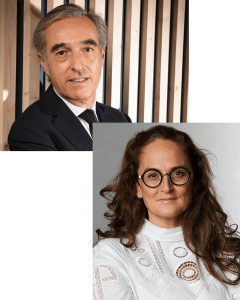Making our contribution to the common good
Joint interview with Éric Ducournau CEO of Pierre Fabre Laboratories and Emma Haziza, hydrologist.
The Pierre Fabre Laboratories are aware of the urgent need to address the challenge of global warming and of the recurring droughts it is causing, and base their strategic choices on preservation of the living.
Eric Ducournau, Group CEO, and Emma Haziza, hydrologist and an expert on territorial resilience strategies faced with climate risks, discuss approaches for preserving resources, and water in particular.
Why was 2022 extraordinary from the standpoint of climate change?
Emma Haziza: There was a rain shortage during the winter phase so the water tables were not refilled. We also had several heat waves, some of which came early and others late. 2022 was the warmest year ever recorded, both in the world and in France, and the southwest was particularly affected.
How are these changes affecting Pierre Fabre?
Éric Ducournau: It takes a lot of water to manufacture cosmetics, and over 60% of our products contain an active ingredient sourced from nature. The need to limit use of resources has encouraged us to explore new solutions. Through ”dry” facilities, for example, which reduce water consumption by at least half, and greater recourse to agroecological cultivation for medicinal plants in order to maintain the landscapes and soils. Our company was founded by a visionary when it comes to biodiversity protection. We realized very early on that companies had to address the climate issue to survive. With Green Mission Pierre Fabre, we are making our own contribution to the collective fight for global carbon neutrality.
What should companies be doing to help the fight against climate change?
Emma Haziza: In France, regulations are still holding back many developments that seem to make good sense, such as using rainwater rather than drinking water for certain sanitary processes. If we are to become more resilient, it is essential that we depend as little as possible on others. Extreme weather can affect a company’s customers and suppliers, with consequences for the company itself. The disruption of the global supply chain in August 2022 caused by the drought in China is a case in point. Companies need to analyze their interdependence to identify risks.
Éric Ducournau: Our first responsibility is to review our industrial processes, by reinventing our formulas, and also to increase our independence. It’s a collaborative effort, involving all our suppliers, to rethink the entire value chain. Finally, it’s important that companies work to develop regulations in order to make it easier to take action.
What measures has Pierre Fabre taken to improve water management?
Éric Ducournau: For several years now, we have been committed to reducing water consumption at all our production sites and we have launched several investment programs. To take just one example, our dermo-cosmetics site in Soual has reduced its consumption by 22% over the last four years, and is in the process of becoming an almost entirely closed-loop facility, with reuse of some of its wastewater after treatment. Other actions include reducing the flow of borehole water at our Avène production unit.
Are you optimistic about our collective ability to meet the climate change challenge?
Emma Haziza: Yes, because there are lots of solutions we can implement. It’s up to us to think of wiser ways of using resources in order to preserve them. We need to rethink our relationship with water and make better use of its cycle. But we must all adopt these solutions, collectively, for them to be successful.
Éric Ducournau: Liberal economies are not used to being confronted with phenomena of this magnitude, which require widespread mobilization and a radical transformation of society. The situation calls for more governance on the part of public authorities and companies. I believe in the strength of a voluntary and collective approach, as demonstrated by the consortium we have created with other manufacturers to improve eco-social product design. I’m still optimistic, because there’s still a way forward, and this is an opportunity for us as industrialists to open up new avenues for innovation.
